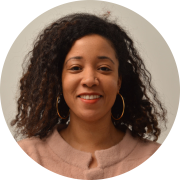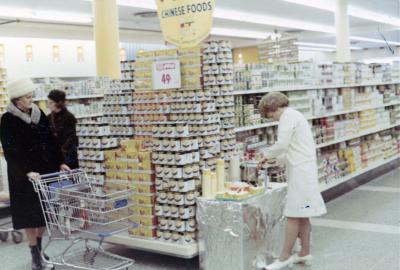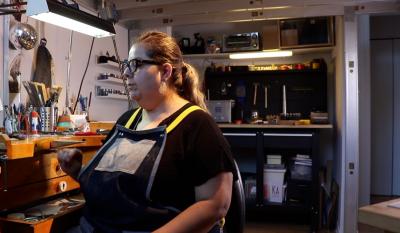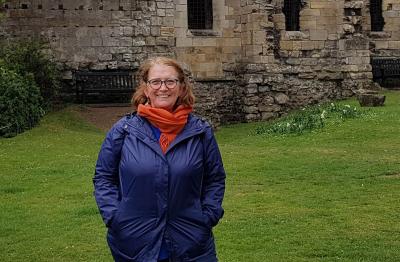For Sanaâ Moâtaz, learning and growing are fundamental. These values and her love of adventure—passed down from her grandfather—are at the heart of her emigration from Morocco to Montréal.
As part of the Women’s Stories of Immigration project, the MEM – Centre des mémoires montréalaises met with women who have settled in Montréal from elsewhere to hear about their experiences. Our Stories series maps unique life paths that intersect across the city, shaping its history.
—
Sanaâ Moâtaz left Morocco for Montréal in search of her destiny—her “personal legend.” “I was looking for something more,” she says. Sixty percent of the Moroccan community in Montréal declared that they were married and not separated in 2011; but Sanaâ arrived in Quebec alone and single on June 5, 2015, at the age of 29.
Creating a destiny
Sanaa Moataz
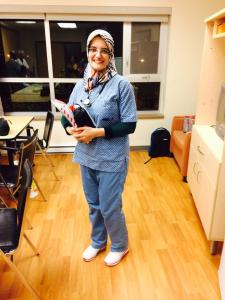
Sanaâ began building her own destiny. Up until then, her parents and five siblings had financially supported her and been there for her. “I had everything,” says Sanaâ, “My father paid for everything.” Arriving here in Quebec meant a major change. She had to overcome certain challenges as a newcomer, such as “paying rent and tuition.”
She was well-prepared before arriving in Montréal thanks to SIEL, an online integration service developed by the Ministère de l'Immigration, de la Diversité et de l'Inclusion. Sanaâ was able to create an action plan thanks to the program, which provides information on how to prepare for integration into Quebec society and the labour market. “Immigration requires advance preparation. ... In my head (and on my computer) I had three different plans.” She had a clear idea of how immigration would go. Already working as a nurse, Sanaâ carried out the equivalency process with the OIIQ (Quebec’s nurses order) before she arrived in Montréal. This helped speed up integration.
Volunteering: opening doors in the labour market
Sanaa Moataz
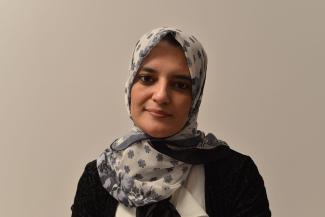
“I have a vision, and strategies. ... I was really open to all suggestions and any chance to get involved, even if it wasn’t related to nursing,” says Sanaâ. While she was waiting to start classes at Cégep Édouard-Montpetit to fulfill the OIIQ’s requirements, Sanaâ volunteered with different community organizations. She was happy to be able to put her skills to good use. Having completed a second university degree in English and linguistics, she was also an ideal candidate for a position that came up as an English educator, which she applied for and secured.
A career advisor at the Collectif des femmes immigrantes du Québec later selected Sanaâ to give presentations to Quebec women on a wide range of themes, including women and religion. The project was funded by the City of Montréal. “I wear a hijab, and I’m proud of it. Because it’s my choice,” says Sanaâ. She is aware of the kinds of questions wearing a hijab in Quebec can bring up, and she has always been open to exchanges about it. “In daring to talk about things and daring to ask ‘why,’ a simple explanation can deconstruct an entire stereotype or prejudice.”
Beyond appearances: an openness to joining Quebec’s communities
Sanaa Moataz - grand-père
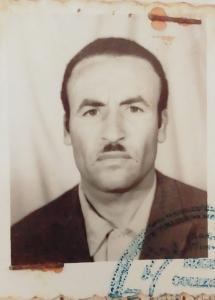
“We’re not really limited as humans. The reality of humanity is universal. ... It gives me the chance to see things differently. ... Not just the Muslim community, the Moroccan community. I want to get to know the Moroccan community, but also all communities,” says Sanaâ. Her words show a remarkable openness and willingness to discuss, despite the context of Quebec’s adoption of a highly controversial ban on religious symbols (Act Respecting the Laicity of the State). Sanaâ says wearing a hijab has not been a barrier to integration so far. She never felt that teachers at the CEGEP where she took classes treated her differently.
In 2016, she finished her full-time program at Cégep Édouard-Montpetit and started preparing for the OIIQ nursing exam. The first time she took the exam, she failed. She accepts this as a life lesson, “Failure is its own kind of diploma. ... I adapted all my strategies.” Everything worked out for the best: Sanaâ passed the exam and, since June 28, 2018, she has been working as a nurse.
Sanaâ’s unique journey, her determination, thirst for learning, and openness are all a tribute to her grand-father. “If someone told me to travel to the other side of the world to learn something new, I would consider it. We’re here so we can learn, so we can grow,” says Sanaâ. Her desire to learn and explore, to live life to the fullest, is something she learned from her grandfather, Bendoud Moâtaz. And she has kept those values alive ever since.
GOUVERNEMENT DU QUÉBEC. « Portrait statistique de la population d’origine ethnique marocaine au Québec en 2011 », Immigration, Diversité et Inclusion Québec, [En ligne], 2014.
http://www.quebecinterculturel.gouv.qc.ca/publications/fr/diversite-ethnoculturelle/com-marocaine-2011.pdf
CONSEIL DU STATUT DE LA FEMME, QUÉBEC. Étude. La participation au marché du travail des femmes immigrées du Maghreb, une étude de cas, [En ligne], Conseil du statut de la femme, décembre 2014.
https://www.csf.gouv.qc.ca/wp-content/uploads/etude-la-participation-au-marche-du-travail-des-femmes-immigrees-du-maghreb-un-cas-detude.pdf
